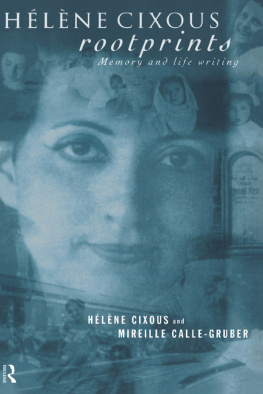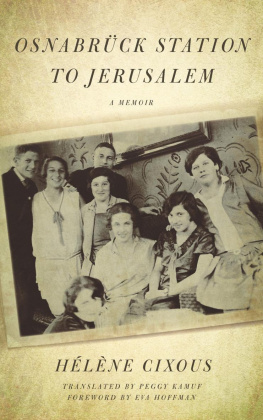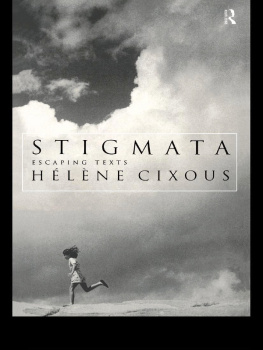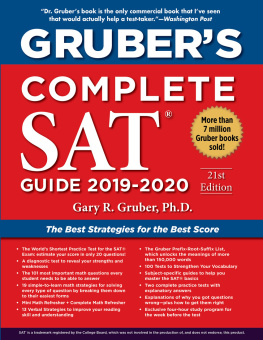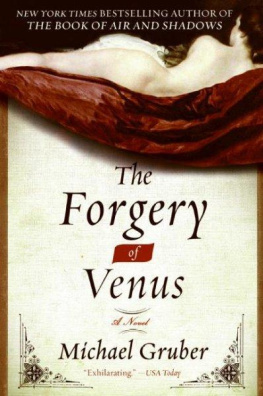Calle-Gruber Mireille - Hélène Cixous, Rootprints
Here you can read online Calle-Gruber Mireille - Hélène Cixous, Rootprints full text of the book (entire story) in english for free. Download pdf and epub, get meaning, cover and reviews about this ebook. publisher: Routledge, genre: Religion. Description of the work, (preface) as well as reviews are available. Best literature library LitArk.com created for fans of good reading and offers a wide selection of genres:
Romance novel
Science fiction
Adventure
Detective
Science
History
Home and family
Prose
Art
Politics
Computer
Non-fiction
Religion
Business
Children
Humor
Choose a favorite category and find really read worthwhile books. Enjoy immersion in the world of imagination, feel the emotions of the characters or learn something new for yourself, make an fascinating discovery.
- Book:Hélène Cixous, Rootprints
- Author:
- Publisher:Routledge
- Genre:
- Rating:4 / 5
- Favourites:Add to favourites
- Your mark:
- 80
- 1
- 2
- 3
- 4
- 5
Hélène Cixous, Rootprints: summary, description and annotation
We offer to read an annotation, description, summary or preface (depends on what the author of the book "Hélène Cixous, Rootprints" wrote himself). If you haven't found the necessary information about the book — write in the comments, we will try to find it.
Hélène Cixous, Rootprints — read online for free the complete book (whole text) full work
Below is the text of the book, divided by pages. System saving the place of the last page read, allows you to conveniently read the book "Hélène Cixous, Rootprints" online for free, without having to search again every time where you left off. Put a bookmark, and you can go to the page where you finished reading at any time.
Font size:
Interval:
Bookmark:

Rootprints

Hlne Cixous is undoubtedly one of the most brilliant and innovative contemporary thinkers. Published here in English for the first time, Hlne Cixous, Rootprints: Memory and Life Writing traces Cixouss development as a writer and intellectual whose remarkable perspicacity and poetic force are known worldwide.
This unique collection speaks with many voices and in different registers, allowing the reader myriad entries into the rich diversity of Cixouss works. At once profound and limpid, Rootprints is an ideal introduction to Cixouss theory and fiction, exploring such vital questions as sexual difference, literary theory, feminism, philosophy, self and other, death and life. It weaves together a broad range of documents: extended interview, critical essays, photographs from Cixouss family album, pages from her private notebooks, with a stunning poetico-biographical musing by the author, complete with bio-bibliographical information and a contribution by Jacques Derrida.
This book will provide endless fascination for all those who wish to get to know the author, the professor, the political activist, the dreamer, the mother, the daughter, the analyst, the thinker, the person, named Hlne Cixous.
Hlne Cixous has written nearly thirty books of poetic fiction, innumerable critical essays, and eight plays. Her works have been translated into more than ten languages. She is Professor of Literature at the Universit de Paris VIII, an experimental university she helped found in 1968.
Mireille Calle-Gruber is Professor of French Literature at Queens University, Ontario. She is also a writer and has published widely. Her works include Les Partitions de Claude Ollier (Paris: LHarmatton, 1996), La division de lintrieur (Montral: LHexagone, 1996) and On the Feminine (New Jersey: Humanities Press, 1996).
Eric Prenowitz is affiliated with the Centre dEtudes Fminines at the Universite de Paris VIII.
This work was made possible by
assistance from the
Social Sciences and Humanities Council of Canada (SSHCC)
Rootprints

Memory and Life Writing
Hlne Cixous and Mireille Calle-Gruber
(translated by Eric Prenowitz)

London and New York
First published in French by Editions des femmes, Paris,
France, as Photos de Racine, 1994
First published in English 1997
by Routledge
11 New Fetter Lane, London EC4P 4EE
This edition published in the Taylor & Francis e-Library, 2003.
Simultaneously published in the USA and Canada
by Routledge
29 West 35th Street, New York, NY 10001
1997 Hlne Cixous and Mireille Calle-Gruber
All rights reserved. No part of this book may be reprinted or
reproduced or utilized in any form or by any electronic,
mechanical, or other means, now known or hereafter
invented, including photocopying and recording, or in any
information storage and retrieval system, without permission in
writing from the publishers.
British Library Cataloguing in Publication Data
A catalogue record for this book is available from the British Library
Library of Congress Cataloging in Publication Data
A catalogue record for this book has been requested
ISBN 0-203-44359-4 Master e-book ISBN
ISBN 0-203-75183-3 (Adobe eReader Format)
ISBN 0-415-15541-X (hbk)
ISBN 0-415-15542-8 (pbk)
For Marguerite Sandr
who has played a vital role
in Hlne Cixouss seminars
for more than twenty years

WE ARE ALREADY IN THE JAWS OF THE BOOK
INTER VIEWS
THE JAWS OF THE BOOK
The windows in the text give
onto Hlne Cixouss notebooks
one cannot talk about it without
attitudes, positions, dispositions
of the body-(and)-of-the-soul or even mechanisms
Mireille Calle-Gruber: One cannot talk about your work if, from the outset, one ignores the thirty or so books of fiction you have written. What is most true, for you, is poetic writing.
Hlne Cixous: What is most true is poetic. What is most true is naked life. I can only attain this mode of seeing with the aid of poetic writing. I apply myself to seeing the world nude, that is, almost to e-nu-merating the world, with the naked, obstinate, defenceless eye of my nearsightedness. And while looking very very closely, I copy. The world written nude is poetic.
The person we love made to appear by an aura. Microscopes, telescopes, myopias, magnifying glasses. All this apparatus in us: attention. To think, I knit my brows, I close my eyes, and I look.
What happens: events interiors, snatchthem from the cradle, from the source.
I want to watch watching arrive. I want to watch arrivances. I want tofind the root of needing to eat. Andtaste it: work of sweat
sleep.
What is most true is poetic because it is not stopped-stoppable. All that is stopped, grasped, all that is subjugated, easily transmitted, easily picked up, all that comes under the word concept, which is to say all that is taken, caged, is less true. Has lost what is life itself, which is always in the process of seething, of emitting, of transmitting itself. Each object is in reality a small virtual volcano. There is a continuity in the living; whereas theory entails a discontinuity, a cut, which is altogether the opposite of life. I am not anathematizing all theory. It is indispensable, at times, to make progress, but alone it is false. I resign myself to it as to a dangerous aid. It is a prosthesis. All that advances is aerial, detached, uncatchable. So I am worried when I see certain tendencies in reading: they take the spare wheel for the bird.
M.C-G.: By theory you are referring in particular here to a north-American situation of which echoes are returning presently to Europe, and which, under the name of feminist theory, has excluded your books of fiction, limiting itself to a few essays or articles: The Laugh of the Medusa, Sorties, your participation in The Newly Born Woman. To carry out this amputation is unjust to your work which is plural; overflowing; which incessantly questions what it draws. The risk, with writing that is attentive to subtleties, is that laziness, deafness, or surprise should lead people to hear only one voice, to stop at a single aspect. That the reading should reduce and reify because this is easier.
One must wonder how this happens. What happensor does not happenwhen one does so little justice to a body of work. Admittedly, there is misunderstanding about the term theory: the writing you practise is more like a form of philosophical reflection that you lead through poetry. But the It is clearly more than a simple pun. To the letter: at the speed of lightning, your text tries to say the raw, blood, tears, the body which is a state of meat. (I am thinking of the self-portrait as a flayed animal in FirstDays of the Year which refers to Rembrandt; and Dluge: She remains alone with her terrible meat p. 93.)
H.C.: I planted those essays deliberately, at a very dated, entirely historical moment, to mark off a field; so that we would not lose sight of it entirelyto have done something deliberately: that already tells you what it is! The Laugh of the Medusa and other texts of this type were a conscious, pedagogic, didactic effort on my part to class, to organize certain reflections, to emphasize a minimum of sense. Of common sense.
Font size:
Interval:
Bookmark:
Similar books «Hélène Cixous, Rootprints»
Look at similar books to Hélène Cixous, Rootprints. We have selected literature similar in name and meaning in the hope of providing readers with more options to find new, interesting, not yet read works.
Discussion, reviews of the book Hélène Cixous, Rootprints and just readers' own opinions. Leave your comments, write what you think about the work, its meaning or the main characters. Specify what exactly you liked and what you didn't like, and why you think so.

